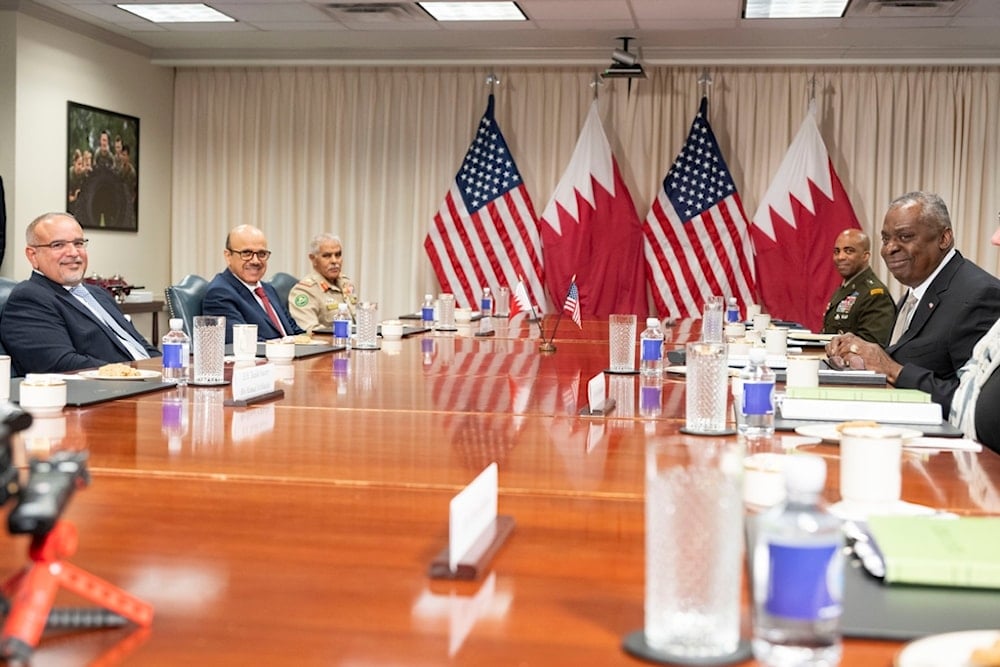US unable to convince Gulf partners in operation against Yemen: NYT
Bahrain stands as the only Arab country partaking in the naval coalition against Yemen.
-

Secretary of Defense Lloyd Austin, right, meets with Bahrain's Prime Minister Salman bin Hamad Al Khalifa, left, at the Pentagon on Thursday, Sept. 14, 2023 (AP)
A notable feature of the recently launched anti-Yemen naval coalition is the absence of any prominent regional powers; a report by the New York Times explains.
Despite the strategic importance of the Red Sea for many Arab countries, including the crucial trade routes from the Suez Canal to the Bab-al-Mandeb Strait near Yemen, none of the regional powers expressed a willingness to commit their navies to the newly formed coalition except Bahrain.
The strained relations between the United States and Arab nations were exacerbated by vocal US support for the Israeli genocidal war against Gaza; which appears to be a significant factor, according to the New York Times, contributing to the reluctance of regional countries to align themselves with the US in a military venture.
Saudi Arabia
Saudi Arabia, grappling with a complex relationship with Yemen even before the Gaza conflict, finds itself hesitant to reinvolve itself in a new confrontation that would have severe consequences for the Kingdom.
Following a series of setbacks in their war against Yemen, Saudi Arabia is reportedly eager to pursue a peace deal rather than restart hostilities.
A recent conversation between US Secretary of State Antony J. Blinken and his Saudi counterpart, Prince Faisal bin Farhan, highlighted differing priorities, the report details.
While the American version of the call emphasized the need for cooperation on maritime security to counter the Yemeni threat, the Saudi version underscored discussions focused on developments in Gaza.
Oman
Furthermore, Oman known for its mediation efforts between the international community and Yemen has opted for neutrality: deliberating not to exert pressure on Yemen to cease its attacks on ships.
According to an anonymous source briefed by Omani officials, Oman asserts that achieving a cease-fire in Gaza must take precedence before addressing the maritime security concerns in the Red Sea.
Read more: State Dept Spox: anti-Yemen naval coalition is open invite
Yemeni Ansar Allah senior official Mohammed Ali al-Houthi said that Yemen would be targeting the vessels of countries that joined the US anti-Yemen naval coalition in the Red Sea.
"The vessels of those countries that will actively take part in the actions against us will be attacked by us in the Red Sea," Mohammed Ali al-Houthi, told the Al-Alam broadcaster.
The criminal onslaught being waged on Palestine forces every free man to take action and underline that they stand against the Zionist arrogance and criminality, Yemeni Ansar Allah spokesperson Mohammad Abdel Salam said on Tuesday.
Speaking to Al Mayadeen during an exclusive interview, the Yemeni top official underlined that Sanaa cannot directly "support occupied Palestine. We do not share any land borders and we can not engage in land confrontations; we do not have the capabilities but to participate by launching missiles and drones and conducting naval operations."
Abdel Salam also revealed that the Yemeni Armed Forces would not hold back and that the escalations taking place might see an uptick depending on the situation on the ground in light of all the challenges being faced by the Palestinian people.
In response to the operations being carried out by the Yemeni people in support of occupied Palestine and the people of Gaza, the United States military launched a new coalition in the Red Sea called "Operation Prosperity Guardian," under the guise of securing maritime trade routes. The United Kingdom, Bahrain, Canada, France, Italy, the Netherlands, Norway, Seychelles, and Spain will be among the countries jointly working with the Pentagon under the coalition.
This prompts the speculation of the US aiming to turn the Red Sea into a warzone to protect Israeli interests rather than simply "keep strategic waterways safe" as US Defense Secretary Lloyd Austin claimed.
Read more: 'Prosperity Guardian': 'Godawful name, unnecessary coalition'- Analyst

 4 Min Read
4 Min Read








